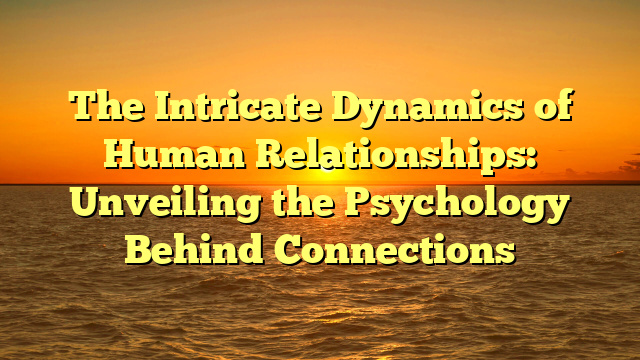The Intricate Dynamics of Human Relationships: Unveiling the Psychology Behind Connections
The Intricate Dynamics of Human Relationships: Unveiling the Psychology Behind Connections
Human relationships are complex and multifaceted, encompassing a wide range of emotions, behaviors, and interactions. From familial bonds to romantic partnerships, friendships to professional connections, the dynamics of human relationships are shaped by a myriad of factors, including psychological, social, and cultural influences. Understanding the intricate psychology behind these connections can provide valuable insights into the nature of human interaction and the ways in which individuals form, maintain, and navigate their relationships.
The Psychology of Human Relationships
At the core of human relationships lies the fundamental need for connection and belonging. From infancy, humans are wired to seek out social interactions and form attachments with others. This innate drive for connection is deeply rooted in our evolutionary history, as it served as a means of survival and protection in the early stages of human development. As we grow and mature, our relationships continue to play a crucial role in shaping our emotional well-being, sense of identity, and overall quality of life.
The field of psychology offers valuable insights into the dynamics of human relationships, shedding light on the underlying mechanisms that drive our interactions with others. Attachment theory, for example, explores the ways in which early childhood experiences shape our patterns of attachment and influence our adult relationships. According to this theory, individuals develop internal working models of relationships based on their early interactions with caregivers, which in turn influence their expectations, behaviors, and emotional responses in their adult relationships.
Additionally, social psychology examines the impact of social influences, norms, and dynamics on our relationships with others. From the role of conformity and obedience to the effects of social comparison and group dynamics, social psychology provides a deeper understanding of the ways in which external factors shape our interactions and behaviors within the context of relationships.
The Complex Nature of Human Relationships
Human relationships are inherently complex, encompassing a wide range of emotions, motivations, and interpersonal dynamics. From the highs of love and intimacy to the lows of conflict and betrayal, relationships can evoke a myriad of feelings and experiences. The intricate nature of human relationships is further compounded by the diversity of individuals involved, each bringing their own unique perspectives, needs, and communication styles to the table.
One of the key factors that contribute to the complexity of human relationships is the presence of both conscious and unconscious processes at play. Our conscious thoughts and actions, as well as our unconscious beliefs, biases, and emotional patterns, all influence the ways in which we engage with others and navigate the complexities of relationships. Unveiling the underlying psychological dynamics at play can provide valuable insights into the complexities of human relationships and offer a deeper understanding of the factors that shape our interactions with others.
Navigating the Dynamics of Human Relationships
Given the intricate nature of human relationships, navigating the dynamics of interpersonal connections can be a challenging and rewarding endeavor. Building and maintaining healthy, fulfilling relationships requires a combination of self-awareness, empathy, effective communication, and a willingness to navigate the complexities of human interaction. Understanding the psychology behind relationships can provide valuable tools and insights for individuals seeking to cultivate meaningful connections with others.
Effective communication lies at the heart of successful relationships, serving as a cornerstone for understanding, empathy, and conflict resolution. By honing their communication skills and actively listening to others, individuals can foster deeper connections and create a supportive, nurturing environment within their relationships. Additionally, cultivating self-awareness and emotional intelligence can empower individuals to navigate the complexities of their own emotions and interpersonal dynamics, fostering greater empathy and understanding in their relationships with others.
Furthermore, recognizing and addressing the underlying psychological patterns and dynamics at play within relationships can help individuals navigate challenges and conflicts more effectively. By gaining insight into their own attachment styles, emotional triggers, and communication patterns, individuals can develop a deeper understanding of their own behaviors and responses within the context of their relationships, paving the way for greater self-awareness and personal growth.
Conclusion
The intricate dynamics of human relationships are shaped by a myriad of psychological, social, and cultural influences, encompassing a wide range of emotions, behaviors, and interactions. Understanding the underlying psychology behind relationships can provide valuable insights into the complexities of human interaction and offer a deeper understanding of the factors that shape our connections with others. By honing their communication skills, cultivating self-awareness, and recognizing the underlying psychological patterns at play, individuals can navigate the dynamics of human relationships with greater empathy, understanding, and resilience.

